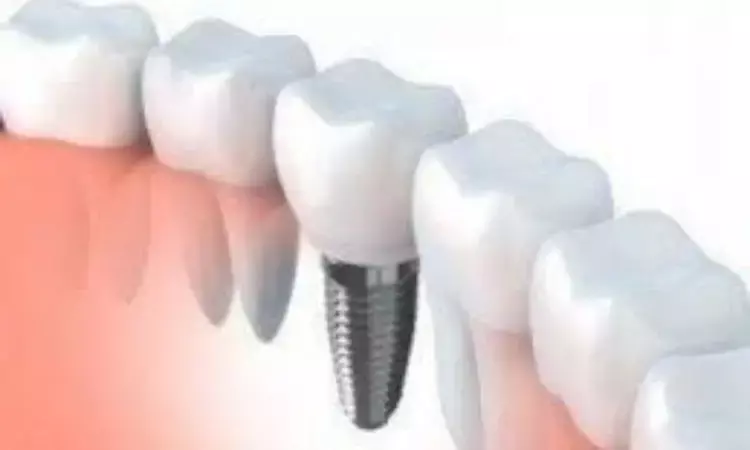- Home
- Medical news & Guidelines
- Anesthesiology
- Cardiology and CTVS
- Critical Care
- Dentistry
- Dermatology
- Diabetes and Endocrinology
- ENT
- Gastroenterology
- Medicine
- Nephrology
- Neurology
- Obstretics-Gynaecology
- Oncology
- Ophthalmology
- Orthopaedics
- Pediatrics-Neonatology
- Psychiatry
- Pulmonology
- Radiology
- Surgery
- Urology
- Laboratory Medicine
- Diet
- Nursing
- Paramedical
- Physiotherapy
- Health news
- Fact Check
- Bone Health Fact Check
- Brain Health Fact Check
- Cancer Related Fact Check
- Child Care Fact Check
- Dental and oral health fact check
- Diabetes and metabolic health fact check
- Diet and Nutrition Fact Check
- Eye and ENT Care Fact Check
- Fitness fact check
- Gut health fact check
- Heart health fact check
- Kidney health fact check
- Medical education fact check
- Men's health fact check
- Respiratory fact check
- Skin and hair care fact check
- Vaccine and Immunization fact check
- Women's health fact check
- AYUSH
- State News
- Andaman and Nicobar Islands
- Andhra Pradesh
- Arunachal Pradesh
- Assam
- Bihar
- Chandigarh
- Chattisgarh
- Dadra and Nagar Haveli
- Daman and Diu
- Delhi
- Goa
- Gujarat
- Haryana
- Himachal Pradesh
- Jammu & Kashmir
- Jharkhand
- Karnataka
- Kerala
- Ladakh
- Lakshadweep
- Madhya Pradesh
- Maharashtra
- Manipur
- Meghalaya
- Mizoram
- Nagaland
- Odisha
- Puducherry
- Punjab
- Rajasthan
- Sikkim
- Tamil Nadu
- Telangana
- Tripura
- Uttar Pradesh
- Uttrakhand
- West Bengal
- Medical Education
- Industry
Nonsurgical debridement with chlorhexidine effectively reduces implant-sites bleeding on probing: Study

A new study published in the journal of Clinical Oral Implant Research showed that nonsurgical mechanical debridement with chlorhexidine was more effective in lowering bleeding on probing (BOP) at implant sites when compared to a placebo.
When there is bleeding (more than one spot at the site around the implant) and/or suppuration on gentle probing, it is known as peri-implant mucositis (PM), an inflammatory lesion in the soft tissue surrounding dental implants without peri-implant bone loss brought on by biofilm accumulation in the peri-implant sulcus. Even though dental implants have been shown to have rather constant survival rates at 95.7% after 5 years and 92.8% at 10 years which is acknowledged that peri-implantitis risk and growing marginal bone loss remain significant potential side effects.
Therefore, the main objective of PM therapy is to lessen the bleeding on probing surrounding implants, according to a recent international consensus study. Thus, Gaetano Isola and colleagues carried out this investigation to assess the efficacy of nonsurgical submarginal peri-implant instrumentation (NSPI) with or without chlorhexidine (CHX) solutions in treating peri-implant mucositis (PM).
The test group (NSPI + 0.12% mouthwash and subgingival CHX irrigation plus tongue brushing with 1% CHX gel) and the control group (NSPI + placebo mouthwash and subgingival placebo irrigation in addition to tongue brushing with placebo gel) were randomly allocated to 56 patients (28 each group).
The proportions of Aggregatibacter actinomycetemcomitans, Porphyromonas gingivalis, Tannerella forsythia, and Treponema denticola were measured at baseline, 1, 3, and 6 months, as well as the full-mouth plaque score (FMPS), bleeding on probing (BOP), modified gingival index (mGI), probing pocket depth (PPD), modified plaque index (mPlI), and full-mouth bleeding score (FMBS).
One of the main goals was to lower the BOP. Data were examined using mixed generalized linear regression to find significant predictors of implant-site BOP and to evaluate BOP decrease at a 6-month follow-up.
Both groups showed a substantial decrease in BOP, mGI, PD, mPlI, FMBS, and FMPS after 6 months. At 6 months, however, the test group outperformed the controls in lowering the proportion of Treponema denticola, mPlI, and median BOP.
Additionally, test therapy, a history of periodontitis, smoking a lot of cigarettes per day, the percentage of Porphyromonas gingivalis, and Tannerella forsythia all had a substantial impact on the BOP decrease of implant sites.
Overall, at a 6-month follow-up, the current study shown that both therapeutic treatments increase microbiological and clinical parameters. However, BOP, mPll, and the percentage of T. denticola were all statistically significantly reduced when the test methodology was applied to NSPI.
Source:
Isola, G., Polizzi, A., Santagati, M., Alibrandi, A., Iorio-Siciliano, V., & Ramaglia, L. (2025). Effect of nonsurgical mechanical debridement with or without chlorhexidine formulations in the treatment of Peri‐implant mucositis. A randomized placebo‐controlled clinical trial. Clinical Oral Implants Research. https://doi.org/10.1111/clr.14405
Neuroscience Masters graduate
Jacinthlyn Sylvia, a Neuroscience Master's graduate from Chennai has worked extensively in deciphering the neurobiology of cognition and motor control in aging. She also has spread-out exposure to Neurosurgery from her Bachelor’s. She is currently involved in active Neuro-Oncology research. She is an upcoming neuroscientist with a fiery passion for writing. Her news cover at Medical Dialogues feature recent discoveries and updates from the healthcare and biomedical research fields. She can be reached at editorial@medicaldialogues.in
Dr Kamal Kant Kohli-MBBS, DTCD- a chest specialist with more than 30 years of practice and a flair for writing clinical articles, Dr Kamal Kant Kohli joined Medical Dialogues as a Chief Editor of Medical News. Besides writing articles, as an editor, he proofreads and verifies all the medical content published on Medical Dialogues including those coming from journals, studies,medical conferences,guidelines etc. Email: drkohli@medicaldialogues.in. Contact no. 011-43720751


